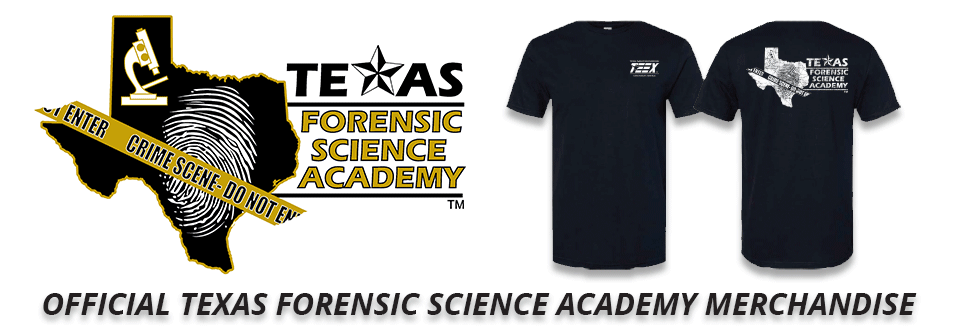Required Courses
OR
To receive the Forensic Technician large professional certificate (10″ X 13″) applicants should submit the Forensic Technician Application and return it to the TEEX Law Enforcement & Protective Services Excellence division. Eligibility of each candidate will be reviewed and email notification of decision will be sent.
Note: The course(s) must be taken within seven (7) years of the date of the application. No course from another training provider will be accepted as an equivalency.

“In my 28 years this was the best crime scene school I have ever attended. I hope to attend many more classes in the future.”
“I feel strongly that this course will improve my scene work. It is a must have for any CSI or Prospective CSI.”
Texas Forensic Science Academy is now selling t-shirts! Order yours at the following link: bit.ly/teexstore

| Category | Course # | Course Title | Description | Funding Options & Delivery Types | Division | Learn More Buttons |
|---|---|---|---|---|---|
| Forensic Technician | FSA100 | Forensic Technician |
Physical evidence collected at the scene of a crime is often the single most critical element in criminal prosecution and conviction. This course provides participants with information, techniques, and methods for conducting crime scene investigations and processing crime scene evidence…. Show more
|
Face-to-Face | Learn More about Forensic Technician |
| Forensic Technician | FSA104 | Latent Print Processing |
Even with the advent of DNA and other forensic technologies, fingerprints continue to be one of the single most important methods for biometric identification and criminal investigation. During this course, participants will receive information and learn techniques and methods for processing… Show more
|
Face-to-Face | Learn More about Latent Print Processing |
| Forensic Technician | FSA106 | Crime Scene Investigation |
Proper crime scene investigation, evidence collection, and documentation are key components to any criminal investigation. This course provides participants with information, techniques, and methods for conducting investigations ranging from general crime scene investigations to death… Show more
|
Face-to-Face | Learn More about Crime Scene Investigation |
